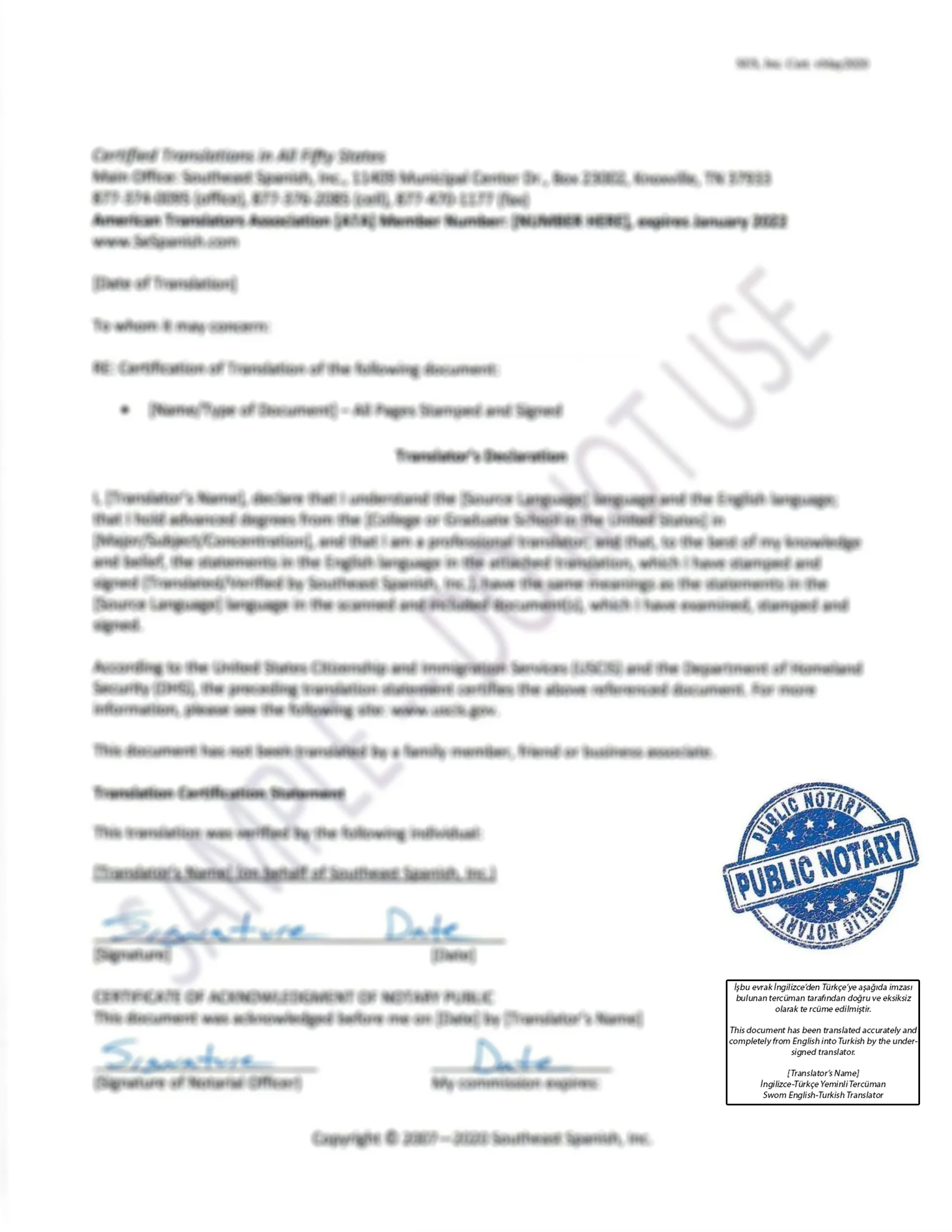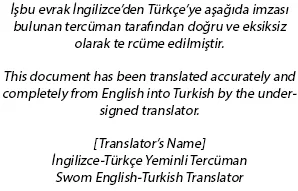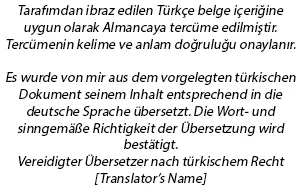-
-
Admin
- 0
Certified Turkish Translation: Difference Between Sworn and Notarized Translations in Turkey
 Translations prepared and signed by sworn translators are called sworn translations. In Turkey, translators must obtain a certificate of oath from notary public offices to become a "sworn translator". They must prove that they know the language pairs they are translating. To do this, they submit their diploma documents or language certificates to the notary. If the notary deems it appropriate after reviewing these documents, a certificate of oath is prepared. This certificate contains the statements in the image below.
Translations prepared and signed by sworn translators are called sworn translations. In Turkey, translators must obtain a certificate of oath from notary public offices to become a "sworn translator". They must prove that they know the language pairs they are translating. To do this, they submit their diploma documents or language certificates to the notary. If the notary deems it appropriate after reviewing these documents, a certificate of oath is prepared. This certificate contains the statements in the image below.  In other words, by taking this oath, the translator guarantees that she/he will translate as stated in the oath text. This indicates that the translations she/he signs will comply with this commitment. Therefore, when this translators signs and stamps the translated documents, it has now become sworn.
In other words, by taking this oath, the translator guarantees that she/he will translate as stated in the oath text. This indicates that the translations she/he signs will comply with this commitment. Therefore, when this translators signs and stamps the translated documents, it has now become sworn.Who Can Become a Sworn Translator in Turkey?
In many countries, exams are held to certify translators. This is how the candidate's proficiency in translation is determined. In Turkey on the other hand, anyone who provides proof of proficieny in a language can become a sworn translator. Graduates of the translation and interpretation department are naturally the primary group that meets this requirement. Similarly, those who graduated from universities that provide education in foreign languages can also apply. Another proof of proficieny is language certificates. Those who have internationally valid certificates such as IELTS and DAF are also candidates for sworn translators. It is also worth noting that: Notaries are not obliged to accept every application. For example, if there are already too many registered translators for the applied language, new applications may not be accepted.
What Does a Sworn Translation Look Like?
Unlike ordinary translations, the translator's stamp and signature are added to a sworn translation. The translator's stamp contains statements indicating that the document has been translated completely and accurately. Final document after this procedure looks like as below:
 The translator's stamp on this page contains expressions indicating the accuracy of the translation. Below are the sample stamps for Turkish-English and Turkish-German sworn translation stamps:
The translator's stamp on this page contains expressions indicating the accuracy of the translation. Below are the sample stamps for Turkish-English and Turkish-German sworn translation stamps:

Sworn translation documents are generally used with wet signatures. Therefore, they are usually delivered by hand or by shipment, rather than online. However, some countries also accept scanned translations. In this case, it is also sent via e-mail.
Difference between Sworn and Notarized Translation
Notarized translations are also prepared by sworn translators. After the translator stamps and signs, it is submitted to the notary for approval. The transaction must be carried out at the notary public that has the translator's oath. The notary or her/his chief clerk confirms that the translator is the person who actually made the translation by identifiying her/his signature. As an indication of this confirmation the notary seal is affixed. This transaction is subject to a fee in Turkey. Certification fees are updated every year by the Turkish Notarys' Union. When calculating the certification fee, the amount of text in the documents is measured as the number of lines. The notary cashier calculates the total price with a formula based on each 20 lines of text. Factors such as the total pages of the document and the number of individual documents involved also affect the price.
Which One Do You Need: Sworn or Notarized
The decisive factor here is the request of the institution to which the documents will be submitted. Generally, for legal translations, sworn translation is not sufficient and notary approval is required. Since such documents are used for critical legal transactions, authentication and validity of the translation is sought. In addition, documents to be used in official transactions such as citizenship, marriage, and guardianship are also subject to notary approval.
Sworn translation is generally requested for official transactions that are not so strict and critical. For example, a sworn translation is sufficient for education-related translations such as transcript translation and diploma translation.
Notarization and sworn translation requirements may also vary from country to country. Countries with strict rules require notary approval for documents sent from Turkey. They may even request an Apostille certificate.
You can request a sworn translation from translation offices for any translation you will use for any purpose. This is not a must, but it ensures the reliability of the translation.
Is Tek Translate a Sworn Translation Office?
Our office is affiliated with Beşiktaş 4th and 5th notary offices in Istanbul. We have translators in almost every language registered with these notaries. We also have hundreds of sworn translators in other cities.
In other words, Tek Translate is a sworn translation office providing services throughout Turkey.
Cost of Sworn Translation
Sworn translation service is not subject to an additional fee. The prices on our translation prices page are also valid for sworn translations. Our prices for sworn translation of official documents are available on the official document translation prices page. In addition to this service, only shipping fee is charged. If you do not need a wet-signed translation, we deliver your documents via e-mail and you do not need to pay this fee.
Write a comment
-
- Translation Hotline: +44 0755 319 5602
- WhatsApp: +90 541 473 0337
-
- Customer LoginTranslator Login
Sworn Turkish Translations
2024 © tektranslate.com - TEK ÇEVİRİ TERCÜME DANIŞMANLIK VE BİLİŞİM HİZMETLERİ TİC. LTD. ŞTİ.
Comments
There are no comments yet on this blog post. You can be the first to comment using the form below.